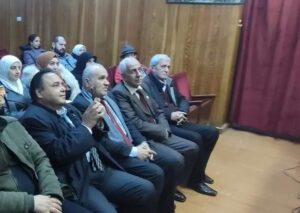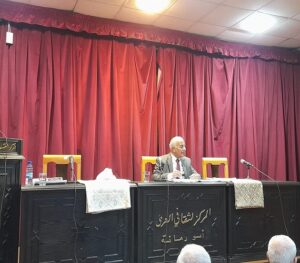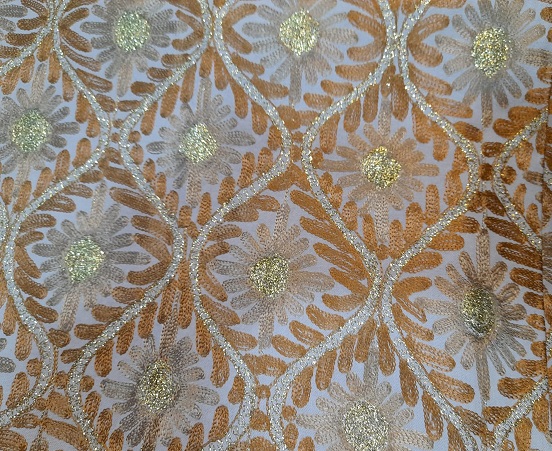“Aghbani craft in Damascus and Eastern Ghouta” is the title of a lecture that was recently delivered by researcher Ahmad Barhoum at the Arab Cultural Center in Abu Rummaneh, Damascus.
At the beginning of the lecture, the researcher Ahmad Barhoum said: The word Aghabani is of Turkish origin and it means decoration on cloth. Some sources documented the existence of this craft in the Syrian Society in Aleppo about 500 years ago or more.
 Some sources also indicate that the Al-Bani family and the Agha family transferred this craft to Damascus and to the city of Douma in the Ottoman era and it likely appeared in the 18th century and was confined to officials, scholars and wealthy people, Barhoum said.
Some sources also indicate that the Al-Bani family and the Agha family transferred this craft to Damascus and to the city of Douma in the Ottoman era and it likely appeared in the 18th century and was confined to officials, scholars and wealthy people, Barhoum said.
The women, who learned the craft at young age from their mothers, excelled in it and Aghabani works became part of the bride’s box. However, the craft ceased to exist due to war and the crisis in Syria, particularly in Douma, which was a center for Aghabani production, and where 15,000 Aghabani machines were operating before the crisis began in 2011, he added.
“If Douma starts to produce Aghabani again, Aghabani will return to life,” Barhoum clarified.
Aghabani is a decorated cloth made by special workshops in Damascus and its countryside. In the past, the fabric was printed on stone and sand, then by copper molds and then by wooden molds, Barhoum said.
 As for the piece of cloth on which the aghabani is apllied, Barhoum said the cloth can be of several small and large sizes including tablecloths, in addition to sheets, wraps around fezzes, towels, and fabrics for dresses, cloaks and trousers.
As for the piece of cloth on which the aghabani is apllied, Barhoum said the cloth can be of several small and large sizes including tablecloths, in addition to sheets, wraps around fezzes, towels, and fabrics for dresses, cloaks and trousers.
Al-Aghbani merchants and distributors and Al-Aghbani’s workshops spread in the homes of Douma in Damascus countryside and then maintained communication with the merchants of Al-Hamidiyah Market and the Silk Market.
It is necessary to preserve this craft, which is considered one of our intangible heritage, Barhoum stressed.
He pointed out that today this craft is being revived. In the past it had a major role in rural society and Al-Aghbani craft, despite its small financial returns, supported women, who are breadwinners of families, and enabled them to spend on the marriage of their daughters, Barhoum concluded.
Reported by : Nada Haj Khidr

